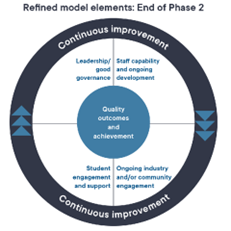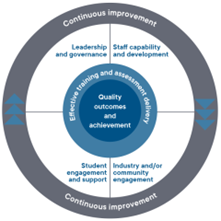- Home
- How we regulate
- Understanding self-assurance
Understanding self-assurance
In 2020, we commenced a program of work to gain better understanding of self-assurance practices in the sector and used this to inform the transition of our regulatory approach with a greater focus on self-assurance.
With the elements and concepts of self-assurance to be embedded in the revised standards, ASQA can now focus on identifying ways to regulate using quality standards and supporting the sector to achieve quality VET outcomes.
The four phases below outline our foundational work with the sector to understand self-assurance.
The co-design process
We worked closely with a diverse range of providers to ensure our understanding of self-assurance is informed by practice and is meaningful in different operating contexts. In 2021-22 we worked through the following co-design process with the sector:
Phase 1 – Preparing for co-design
October – December 2021 We held workshops with our Provider Roundtable, Stakeholder Liaison Group Self-Assurance sub-group, VET regulators and state and territory funding authorities in 2021 and early 2022 to understand the context and inform the co-design.

Figure 1
The draft model for self-assurance
Phase 2 – Co-designing a draft model
January – March 2022 In early 2022, we began the co-design process with provider focus groups, stakeholder interviews and workshops to inform the development of a draft model for self-assurance.
You can read more about what we heard from the sector and the draft model for self-assurance.
Phase 3 – Testing the draft model
April – June 2022 We tested the draft model for self-assurance through further focus groups, feedback via our website and workshops with key stakeholders.
The co-designed working model

Figure 2
A working model for self-assurance
In September 2022, we shared a working model for self-assurance (see Figure 2) that provides a framework for providers to identify systems and practices to monitor quality and compliance and continuously improve training outcomes.
The model has four elements, or areas of practice that support quality training:
- leadership and governance
- student engagement and support
- industry and community engagement
- staff capability and development.
Monitoring quality and compliance against these four elements supports:
- effective training and assessment delivery
- quality outcomes and achievement.
A working definition of self-assurance
Self-assurance refers to how providers manage their operations to ensure a focus on quality, continuous improvement and ongoing compliance with the Standards for Registered Training Organisations (RTOs) 2015 (the Standards).
Under a self-assurance model, quality and continuous improvement are shared responsibilities through the different roles of individual providers, sector leaders and the national regulator.
It involves providers having systems in place to critically examine their performance against the Standards and training outcomes, on an ongoing basis, to meet obligations and to identify ways to continuously improve outcomes.
You can read more about the Phase 3 report to ASQA.
Phase 4 – Supporting providers and continuous improvement
We continue to progress our work in this space through embedding and realising the definition of self-assurance in our how regulate:
- 2021: We revised how we assess compliance with the Standards and released a new approach to performance assessment which focuses on the systems and practices providers have in place to examine their own performance and training outcomes.
- 2022: We provided feedback to DEWR on the draft revised Standards to support the operationalisation of the standards consistent with policy intent.
- 2023:
- We continue to engage with providers, via the Stakeholder Liaison Group to identify the guidance and materials that providers need to support their regulatory obligations and build capability for self-assurance.
- We redesigned the first iteration of the Annual Declaration on Compliance by amending the questions asked to seek provider insights about challenges with the Standards.
- We are collaborating with the Department of Employment and Workplace Relations (DEWR) to pilot the revised standards.
Share
